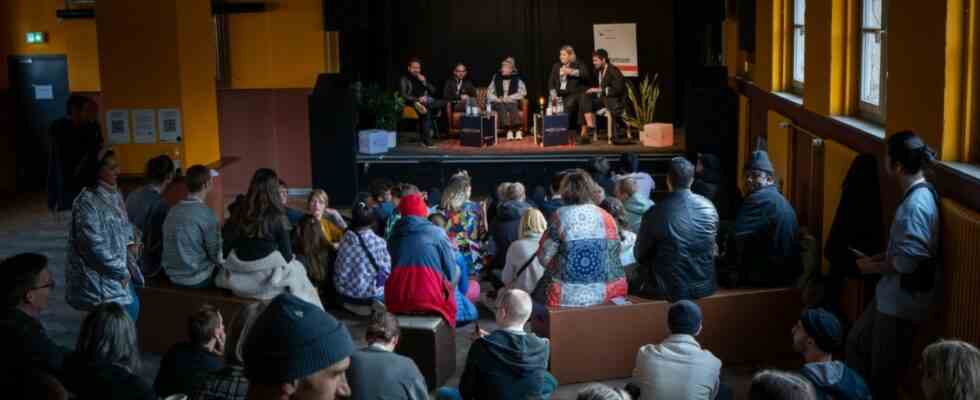“Everything that came into being came out of youth culture,” said Klaus Joelsen from Jugendkulturwerk München in a discussion with Munich city councilors about local pop culture funding. It was not as a podium guest that he interfered in that round of talks at the celebrations with his demand for a process-based instead of result-oriented promotion of youth culture. Joelsen was one of many visitors to the two-day “Listen To Munich” pop conference, to which the pop department had invited at the weekend celebrations.
The fact that the discussions about pop offered here turned out to be as lively and rousing as pop concerts themselves was not only thanks to the competent podium guests invited by the pop department in cooperation with other participants. Rather, it was the many interested visitors who, like Joelsen, as experts in their own cause, encouraged the talks on various pop topics with cultural-political demands and curious questions. This was also what the organizers wanted, who therefore provided additional microphones for the statements from the so-called audience area.
Musicians, club operators, event organizers and other people involved in shaping pop culture did not sit opposite the usually equally competent podium guests in such an audience area. Rather, everyone gathered here was united by a common concern for pop culture, which despite its social importance is still not held in the same regard as, for example, so-called high culture. Without wanting to belittle the importance of municipal theaters, it has therefore been questioned why these theaters receive many times more funding than, for example, the celebrations, which are also municipally funded as a place of pop culture. And it should be noted that this is not a debate about envy, but repeated reference to a feeling of injustice, which was not least intensified when Corona measures equated pop culture venues as commercial companies with brothels.
In any case, pop culture is not attributed to art, but to cultural and creative industries. That is why their promotion is also the responsibility of the Ministry of Economics, explained the former Bavarian Minister of State for Science, Research and Art, Wolfgang Heubisch (FDP), in one of the many panel discussions at the pop conference. However, because the cultural and creative industries are a “huge economic factor” in Bavaria, there is no reason why the Ministry of Economic Affairs does not provide sufficient funding, said Heubisch: “The city of Munich is one of the top locations for the cultural and creative industries in Europe.” According to his information, “the city of Munich is larger than London in this area. And the State Opera also gets support. Why doesn’t the independent scene get support as well?”
The independent scene, on the other hand, is fed up with having to repeatedly find out who is not responsible for their concerns when it comes to applications for funding and other forms of support. This has been emphasized in various posts. According to some club operators, it could help if the church-argued ban on dancing were finally lifted. After all, this affects nine quiet days a year on which those cultural events have lost revenue despite the separation of state and religion that is always emphasized elsewhere.
It was about suggestions, not accusations
At the “Listen To Munich” pop conference, however, such statements were not formulated as allegations, but as suggestions that were not only aimed at the representatives of the people who were present. Rather, all those present at the pop conference saw themselves as a community that, united in discussion, explored how pop culture can be strengthened. Accordingly, the various protagonists of a Munich pop culture did not see each other as competition. why? Hotspots such as the Kunstpark Ost or the inner-city Feierbanane attracted even more visitors when several clubs lured them into the respective quarters. Emphasis was also placed on how public space should be designed, what multiple uses of spaces are possible or how pop culture can be promoted in such a way that everyone should really be able to participate in it, i.e. a socio-political sense of responsibility on the part of those who create culture. That’s why promoting pop is also a strengthening of democracy.
When young people in the Kranhalle late in the evening were still interested in discussing the use of open spaces in Leipzig for pop culture with an employee of the Leipzig city administration, while concerts next door were already drawing the end of the conference, it became clear once again how important the pop conference was to them, the cultural referent Anton Biebl now also wants to have it evaluated.

